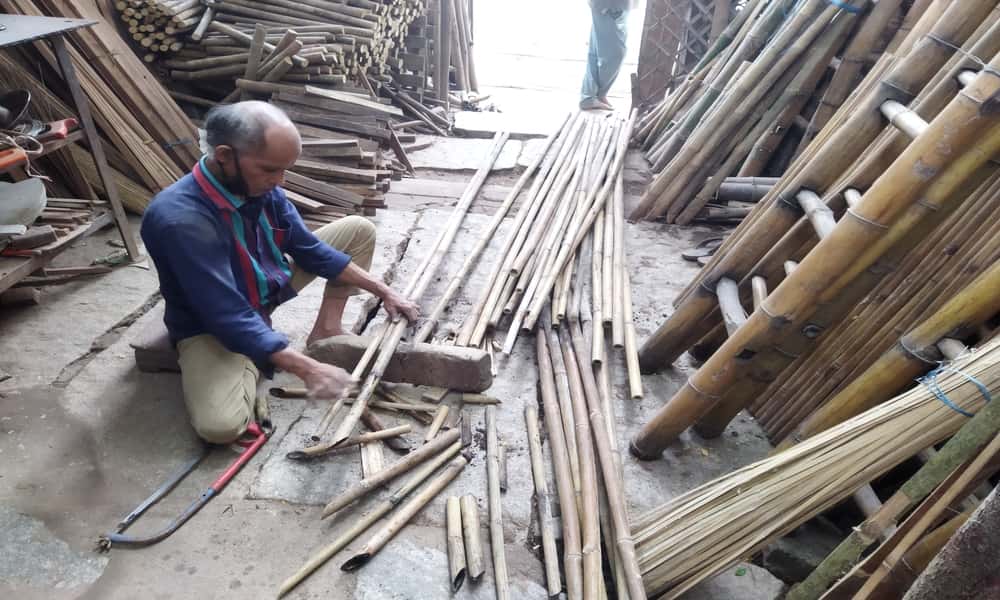In 2020-21 budget, the Karnataka state government had allotted Rs. 18 crore for the National Bamboo Mission (NBM).
Many bamboo artisans and business person are unaware of the National Bamboo Mission (NBM). The money set aside for the NBM has remained unused.“I do not know of any such scheme. My business and others’ were totally closed during the lockdown and we got no government assistance,” said Mohammed Saif, owner of Mohammed Bamboo Works in Bamboo Market, Shivajinagar.
“I’ve heard of a loan scheme where we can take a loan at a low interest rate. But I am not interested in it as it involves going to many offices for the paperwork,” said Ayaz, a veteran bamboo businessperson in Shivajinagar.
With no assistance from the government during the lockdown, many workers have struggled as it was difficult for them to survive during the lockdown.
The National Bamboo Project was formed in 2007-08 to revitalise India’s underdeveloped bamboo industry. The Cabinet Committee on Economic Affairs (CCEA) approved a restructured National Bamboo Mission on April 25, 2018, with the goal of strengthening the marketing of bamboo products, especially handicraft goods.
“Many workers in the bamboo industry do not know about the scheme. Some of them think it is about handicrafts, while others think it is about something else. There is no clear information about the scheme among the workers,” said M Iyer, member of the State Bamboo Council (SBC) and owner of Bamboopecker.
Iyer explained that there are a number of activities under NBM which are financed by a credit linked subsidy (CLS) by Financial Institutions (FIs) including banks. Business persons can submit their project proposals to the eligible financial institutions for the grant of subsidy and the SBC, in co-ordination with the NBM will look into it.
The main objective of the scheme is to develop bamboo in forest lands through Forest Development Agencies (FDAs) with the support of joint forest management committees (JFMCs), and in non-forest areas through Bamboo Development Agencies (BDAs).
In 2019 and 2020, the NBM was allotted a fund of Rs. 100 crore. The Karnataka SBC has co ordinated with many other states’s SBCs to bring bamboo workers together under the NBM.
Bank divisions and district-level bamboo production agencies track each subsidy receiver’s initiative. They also monitor project work within the general framework of the above scheme’s operating guidelines. Strengthening bamboo mandis, bazaars, and haats was listed in NBM’s operational guidelines as a way to improve the bamboo industry.
“We’ve worked alongside with the SBC and the NBM to implement various nursery schemes, farming methods, and research projects among the various bamboo workers,” said P. Shridhar, former member of the Karnataka SBC and chairman of the Bamboo Society of India.
In 2019, the Industree Foundation, a non-profit organisation (NPO), and the United States Agency for International Development (USAID) partnered with the state’s NBM to open a Bamboo Research Center in Channapatna, Karnataka.
The “Producer-Owned Women’s Enterprises” (POWER) project of the Industree Foundation is funded by USAID as part of Ivanka Trump’s White House Women’s Global Development and Prosperity (W-GDP) initiative.
“Over the years, the SBC has invested in informing the workers in the industry about the different business aspects of the bamboo industry via seminars, workshops, etc.,” said Iyer.
“If anyone wishes to apply for any scheme under the SBC and the NBM, they have to come to the head office of the SBC in Bangalore. Not everyone can afford that,” said Iyer. Focusing on the need to move the process online, Iyer said that if the entire process of the NBM is shifted online and the SBC conduct workshops to educate workers about the benefits of the scheme, the mission could be a great success.
During COVID-19, a campaign called Creative Dignity (CD) brought together a diverse group of creative creators, practitioners, and professionals to motivate Indian artisans. The main goal was to provide relief and then concentrate on the artisan’s recovery and rejuvenation. This campaign has not really helped bamboo artisans from Bangalore.







